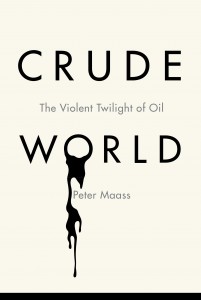Yesterday I declared this the Week of Oil. While the Obama administration is calling for more green jobs and support of the clean tech industry, it is also calling for more research on ‘clean coal’ and more off-shore drilling. It’s these last two items that really seem to fire people up so I decided it was high time I learned more about oil’s world and I began by reading “Crude World: The Violent Twilight of Oil,” by Peter Maass.
 This book takes you on a journey around the world and throws you into the violence that surrounds nations’ quest for oil. It’s not pretty. To reiterate what most people already know, the majority of oil left in the world lies in volatile areas. And not just the Middle East, but areas of Africa and South America. Too many people believe that oil leads to wealth and the revival of a country. However, too often, it leads to corruption by government officials, increased poverty and unrest – not to mention the environmental devastation that occurs.
This book takes you on a journey around the world and throws you into the violence that surrounds nations’ quest for oil. It’s not pretty. To reiterate what most people already know, the majority of oil left in the world lies in volatile areas. And not just the Middle East, but areas of Africa and South America. Too many people believe that oil leads to wealth and the revival of a country. However, too often, it leads to corruption by government officials, increased poverty and unrest – not to mention the environmental devastation that occurs.
The sad thing is that despite knowing better (America is all for human rights, right?) our own corporations support these evil regimes. A case in point that Maass discusses is Equatorial Guinea and its corrupt dictatorial President Teodoro Obiang. His reported salary is $60,000 a year (US dollars) but it was recently discovered that he has bank accounts in access of $700 million. The bank accounts reside in the U.S.
So while he’s rolling in the dough, the people of his county are uneducated, underfed and lacking in basic amenities like clean water and electricity. Eventually, the Senate released a report detailing “money laundering and foreign corruption” after being tipped off by journalist Ken Silverstein, and in the report wrote that oil companies operating in the country “may have contributed to corrupt practices in the country.” Naturally, the oil companies denied paying bribes (which is illegal), a few hands were slapped and business as usual resumed. The only true losers were the citizens of Equatorial Guinea.
This type of story is told over and over again in Crude World and Maass reminds us that we need to start looking at our dependence on oil not only in terms of energy security and environmental issues, but in terms of the human rights issues that prevail in countries rich in oil. Our thirst for oil feeds the fires of corruption, instability and violence in many regions around the world. We must stop choosing to ignore this cost of oil that is not represented in the price at the pump.
Ultimately, Maass stresses the importance of conservation and development of renewable energy. He also favors a Publish What You Pay approach that requires companies to disclose contracts they sign or payments that make and receive. And finally he proposes one last remedy: social values. “Even when enforced aggressively, laws alone cannot do everything; they need to be complemented with social pressure that opposes unethical and exploitative profiteering.”
If you have decided to stop looking the other way and confront the ills that are born with our addiction to oil, then this is good place to start.

